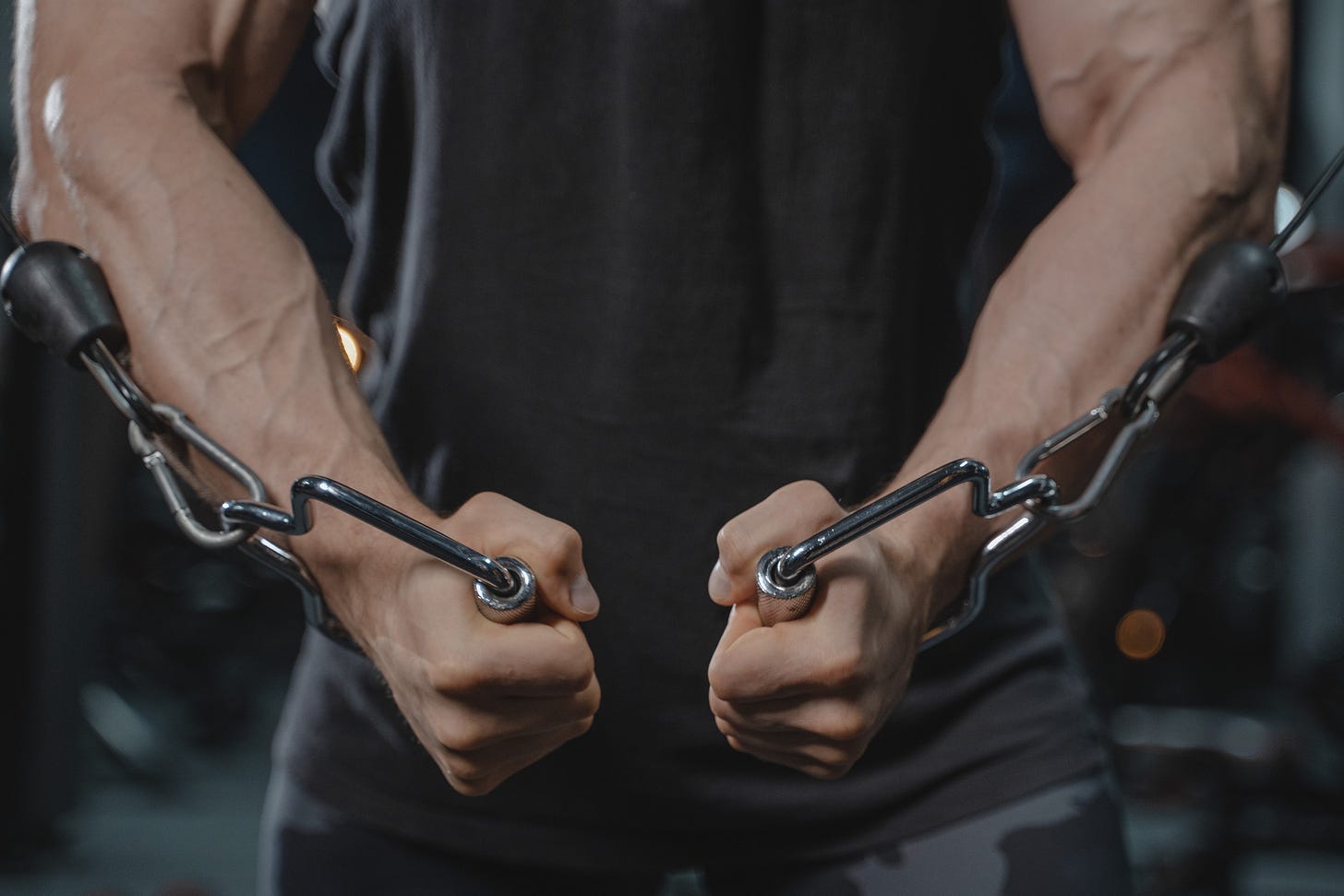Masculinism 2.0: What Would A Positive, Healthy New Men's Movement Look Like?
What if truly progressive men tossed up a new, better masculinity salad, taking the best of the old school but replacing misogyny with *productive* power?
Researching Andrew Tate for my last article sent me down a few rabbit holes in the past few weeks - like learning more about Andrew Tate than I needed to know for the article, and then wondering what it is about women that makes certain men obsessively hate on half the human race.
I’ve been trying to understand the roots of misogyny for many years, and by this I mean the real stuff - not the everyday inconsiderations, and especially not victim feminists’ hypersensitive ‘patriarchy’ obsession.
What was it, I wondered, that turns guys like Andrew Tate into world-class, intentional, career woman-haters? What is going on with hyper-aggressive men and what is it about women they find so threatening? I mean yeah, I know, ‘Power and control’.
The question is, why? Why cling to such an outdated, clearly toxic ideology that harms others and makes its acolytes more, not less miserable?
The two types of misogyny
While the Andrew Tates of the world blather on about 'escaping the Matrix’ (i.e., a more equal, adult world) they never wonder whether perhaps they, themselves, have chosen ‘the Matrix’.
After all, if The Matrix is something you’re born into and can’t see, but has existed seemingly forever, then 12,000 years of patriarchy is the very definition of. A pack of feminist Trinitys trying to cajole you to take the ‘red pill’ and open your eyes to the outside-the-manbox reality you’ve never questioned must be pretty threatening to men who would, in fact, prefer the blue pill, which allows the taker to return to the existence of familiar, comforting ignorance and neither grow nor find real happiness as a genuinely autonomous human being.
Psychologists distinguish between two types of sexism, hostile and beneficent.
Hostile sexism is the aggressive, often-violent, degrading, humiliating, expressed hatred and treatment of women. Andrew Tate is an extreme example but his brethren may be found in those politicians, religious leaders and talk show pundits who fearlessly make nasty statements about women and their place.
Benevolent sexism is less violent and often more attractive to women, with men who are more caring and gentle, but nevertheless see women as somehow ‘less-than’. Fragile and vulnerable, the ladies can get male protection as long as the Li’l Missus sticks with traditional gender roles, especially the man as the head of the family, rather than as a co-parent and equal.
Male protection shouldn’t come at the expense of female freedom. Benevolent sexism is still sexism.
Is there a Masculinity 2.0 lesson in a 1997 movie?
Studies show that men exhibiting hostile sexism in heterosexual relationships were directly associated with perceived (by themselves) lower levels of power, a view that wasn’t often shared by their partners. Although feeling powerless is at the heart of hostile sexism, even powerful men can be hostile sexists, and the authors theorized their sense of powerlessness stems from a self-perceived lack of power in their personal relationships. One author notes, “Men who hold sexist attitudes appear to be enacting aggression in an attempt to restore a [perceived] lack of power.”
Social psychologist Susan Fiske commented that men who hold hostile sexist beliefs also hew to ‘zero sum’ thinking about power in the relationship: That it’s a finite resource and that if the woman is ‘competing’ by having a job she loves or something important to her that’s not him, that he suffers, consequently, a reduction in power. Being bigger and badder is the only way he feels he can re-assert his own power. It is, of course, at the root of domestic violence as well.
Hostile sexist men become so sensitive to what they perceive to be power imbalances that they underestimate the power they actually have.
In their minds, power is finite, like rare metals or something.
Masculinity has taken a real beating in the last forty years, not just from feminists who think everything masculine and muscular must be bad, but from cardboard cowboys and a perpetually sexually frustrated manosphere, in which the very worst of traditional masculinity displays the perpetual us-against-them mentality. It’s us against the bitches. Zero-sum thinking. If she has more power, I have less power.
I keep thinking of the military battalions in the 1997 movie Starship Troopers, based on a Robert Heinlein novel. Some critics called both the movie and the 1960 book it was based on pro-fascist, but director Paul Verhoeven said he was satirizing fascism based on his experiences growing up during the War in the Netherlands. Starship Troopers, like many of Verhoeven’s movies, are breathtakingly violent but what stuck with me after seeing the movie twenty-six years ago is how sex discrimination appeared non-existent in the 23rd century. Particularly noteworthy was the co-ed shower scene:
It’s the only one I can find and it’s dubbed in Italian (no subtitles). Watch the body language.
Men and women worked together in a military institution as equals, without the harassment and misogyny of today’s military. A co-worker commented at the time there’s no way that could ever happen, because it was simply within men’s DNA to protect women, even fellow soldiers, which would be detrimental when your focus must be solely on the enemy.
It struck me as a fairly infantilized image of men, unable to grow or move beyond ‘the way things have always been’.
Why couldn’t men and women learn to work together as equals, even to take a shower together without a lot of staring, butt-grabbing and juvenile snickering? No worries from the women of sexual assault, no worries from the men they’re seeing other men’s junk and wondering if others think they’re gay.
It didn’t seem beyond the ken to me. Okay, it wasn’t happening in 1997, and it still hasn’t happened in 2023, but Starship Troopers takes place in the 23rd century, so sure—maybe in two hundred years?
Maybe earlier, if we start working together instead of against each other.
The Masculinity 2.0 salad bar
Just as not all feminism is toxic, neither is all masculinity.
Naomi Wolf distinguishes between two types of feminism. Victim feminism identifies with victimhood and female vulnerability. Narratives include: All men are rapists, ‘patriarchy’ and ‘misogyny’ are everywhere, and if we wield personal power, others might not like us (something men seeking power never worry about).
Power feminism, on the other hand, seeks personal power, using one’s financial, economic, or social power to promote the greater good, which sometimes means limiting others’ power (like reducing or ending rape). Power feminism is mostly about taking control of one’s life, safety, and personal responsibility.
This aligns with what the feminist Pagan author Starhawk expressed in her books The Spiral Dance and Dreaming The Dark.
Let men be men, let them be as wild and strong and powerful as they want, but direct the power toward themselves and using it to help, not harm others. Let them especially do what they’re biologically suited to do, protect women and children who are physically weaker than they.
I was quite grateful a few years ago when a stranger intervened when a street guy threatened me. I thanked him for standing up for a woman, and said I appreciated him helping out a stranger.
Always thank The Patriarchy when it does something powerfully helpful. They might do it again.
Men help women today, bringing more diversity to networks and institutions that have been historically male. When President Biden appointed Ketanji Brown Jackson to the U.S. Supreme Court, he was accused of affirmative action and choosing a candidate for biology rather than merit. But I argued Supreme Court picks were biologically-based for over 175 years, the requirements being white and male. It changed in 1967 with Thurgood Marshall, the first black Justice, and then again in 1981 with the first female Justice, Sandra Day O’Connor.
The Supreme Court needs more diversity, especially of partisan politics.
The he-man grands chefs of Masculinity 2.0 can salad-bar pick which elements of masculinity work for the greater good of all, and which elements are the bacon bits, creamy dressing and grated cheese of misogyny - best left behind because they’re not good for your (mental) health.
How do we start eliminating misogyny?
I see two elements of toxic masculinity I’d define as being the primary culprits in humanity’s chronic misogyny problem: The domination paradigm and the not-female paradigm.
The modern male’s preoccupation with holding power stems from a historical perogative to conquer and dominate. It’s not a model we can entirely abandon as, on a planet with eight billion people, not all will be on board with getting in touch with their inner good citizen. Vladimir Putin has demonstrated toxic masculinity ain’t goin’ nowhere soon, and we have to maintain a military, regimented approach to fight hyper-masculinists like the Russian government and Islamist terrorists.
What we can do in our own culture is to redefine where the need to dominate and conquer belongs, and where it doesn’t (i.e., personal relationships, whether romantic, professional, or friends). That’s a broader conversation best left for another day, but I think it’s where we need to start.
The other culprit, the self-definition of ‘not-woman’, starts from a very early age, as little boys develop their sense of masculinity by distinguishing themselves from girls. Yet girls don’t define themselves as ‘not-boy’ growing up, unless they’re noting how not to act like a butthead.
I’ve never understood why boys, and later men, defined themselves as not-female, but psychologists link it to the relationship to the mother, who is more often than not the primary caregiver. Little boys are vulnerable and dependent on the mother, and fear being abandoned by her (as some are, psychologically, emotionally or physically). They identify vulnerability with reliance on women. Ergo, don’t rely on women and you’ll be safe. Little girls, meanwhile, internalize their misogyny, and identify with their mother (the ‘enemy’ for boys).
Homophobia stems directly from the misogyny of not-woman. Nothing is more masculine than ‘dominating’ a woman by penetrating her sexually, perhaps literally if she resists. So a man who allows himself to be penetrated by another man permits himself to be treated like a woman, accepting the weaker and submissive position.
The misogynist perceives the act of being penetrated with weakness. No one wants to be weak, or perceived as weak.
Penetration doesn’t have to mean domination. That’s a truly toxic masculine narrative we need to throw away. It’s the high-caloric, carbs-laden, trans-fats salad dressing of yore. It’s ridiculously bad for everyone.
‘Weakness’ is all around us, and it’s not bad. A truly strong person (not just men) defends those which cannot defend themselves - other human beings (including smaller, more vulnerable men), children, animals, and the environment. The male and female Starship Troopers worked together against a common enemy, the ‘bugs’. It’s about the only sex-positive element of a movie that otherwise depicted a ridiculously toxic masculine society with demonstrably wrong ideas by today’s standards. But hey, we can at least take women as genuine equals for our non-misogynist salad bowl.
What do you think about Masculinity 2.0? What would it look like to you?
The Insecurity That Drives Misogynists (Psychology Today)
Men Hating Women: A look into the psychology of misogyny (British GQ)
How Toxic Is Masculinity? A crop of new books reconsiders feminism’s stance toward men (New Yorker)
Why Men Oppress Women: The psychology of male domination (Psychology Today
Why Are Men Afraid Of Being Controlled By Women? (Psychology Today)
When I’m not looking for healthier mental meals at the sociopolitical salad bar, I help women and others reclaim their power on my website, Grow Some Labia.







